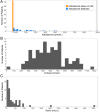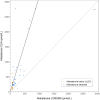Unquantifiably low aldosterone concentrations are prevalent in hospitalised COVID-19 patients but may not be revealed by chemiluminescent immunoassay
- PMID: 36006845
- PMCID: PMC9578067
- DOI: 10.1530/EC-22-0190
Unquantifiably low aldosterone concentrations are prevalent in hospitalised COVID-19 patients but may not be revealed by chemiluminescent immunoassay
Abstract
Objective: Previous studies have reported conflicting findings regarding aldosterone levels in patients hospitalised with COVID-19. We therefore used the gold-standard technique of liquid chromatography-tandem mass spectrometry (LCMSMS) to address this uncertainty.
Design: All patients admitted to Cambridge University Hospitals with COVID-19 between 10 March 2020 and 13 May 2021, and in whom a stored blood sample was available for analysis, were eligible for inclusion.
Methods: Aldosterone was measured by LCMSMS and by immunoassay; cortisol and renin were determined by immunoassay.
Results: Using LCMSMS, aldosterone was below the limit of detection (<70 pmol/L) in 74 (58.7%) patients. Importantly, this finding was discordant with results obtained using a commonly employed clinical immunoassay (Diasorin LIAISON®), which over-estimated aldosterone compared to the LCMSMS assay (intercept 14.1 (95% CI -34.4 to 54.1) + slope 3.16 (95% CI 2.09-4.15) pmol/L). The magnitude of this discrepancy did not clearly correlate with markers of kidney or liver function. Solvent extraction prior to immunoassay improved the agreement between methods (intercept -14.9 (95% CI -31.9 to -4.3) and slope 1.0 (95% CI 0.89-1.02) pmol/L) suggesting the presence of a water-soluble metabolite causing interference in the direct immunoassay. We also replicated a previous finding that blood cortisol concentrations were often increased, with increased mortality in the group with serum cortisol levels > 744 nmol/L (P = 0.005).
Conclusion: When measured by LCMSMS, aldosterone was found to be profoundly low in a significant proportion of patients with COVID-19 at the time of hospital admission. This has likely not been detected previously due to high levels of interference with immunoassays in patients with COVID-19, and this merits further prospective investigation.
Keywords: COVID-19; SARS-CoV-2; renin-angiotensin-aldosterone system.
Figures




References
-
- UK Government. Coronavirus (COVID-19) in the UK: deaths. London, UK: UK Health Security Agency, 2022. (available at: https://coronavirus.data.gov.uk/details/deaths?areaType=overview&areaNam...)
-
- Hoffmann M, Kleine-Weber H, Schroeder S, Krüger N, Herrler T, Erichsen S, Schiergens TS, Herrler G, Wu NH, Nitsche Aet al.SARS-CoV-2 cell entry depends on ACE2 and TMPRSS2 and is blocked by a clinically proven protease inhibitor. Cell 2020181 271.e8–280.e8. (10.1016/j.cell.2020.02.052) - DOI - PMC - PubMed
Grants and funding
LinkOut - more resources
Full Text Sources

